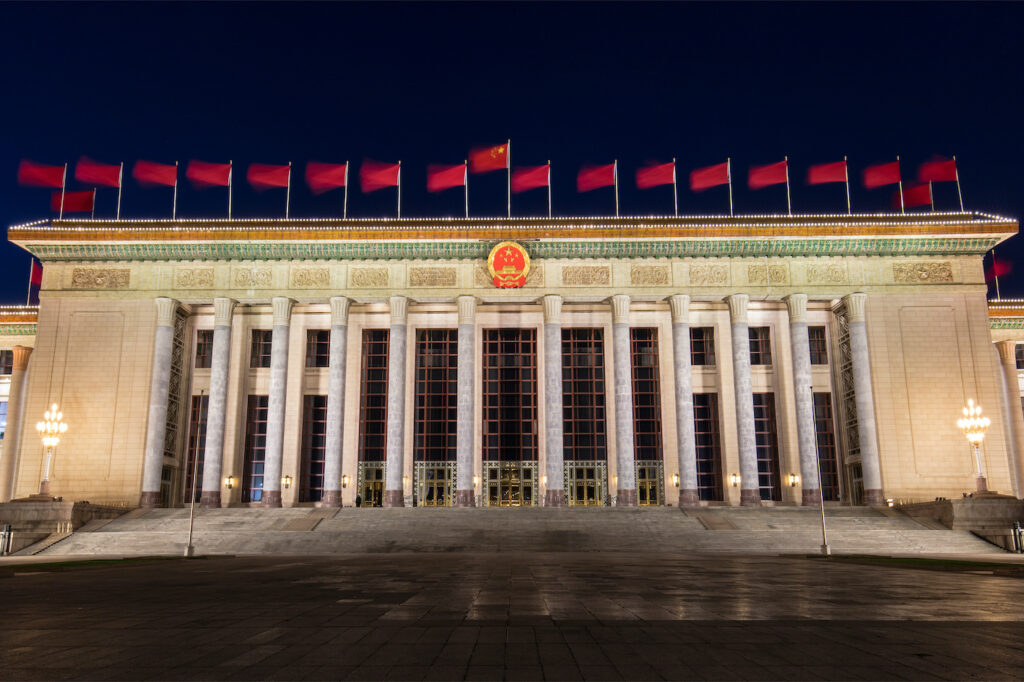As I wrote in a recent article published in the Wall Street Journal, there is no rule of law under authoritarian rule. No matter if we are talking about emperors of old or the party-state systems of the past century (otherwise known as communist authoritarianism), the enduring characteristics are the same: a tiny minority or even one individual holds the highest levels of power, monopolizing the authority and resources of the nation. Any laws created in such systems are merely tools to protect these monopolies for the benefit of the rulers, at the expense of the ruled.
Talking about the rule of law in a place like China (more specifically, CCP-occupied China) is thus as absurd as talking about traffic regulations in the wilderness. The so-called law is the law of kings, wielded at whim. Unlike in democratic systems where the law stands above all people and ensures social justice and independence of government branches, under authoritarianism, those with power are the law.
As I did in the Wall Street Journal article, I would like to draw on the case of human rights attorney Gao Zhisheng to illustrate how the regime uses its legal system to destroy its opponents. But Public Discourse’s longer format allows me in this essay to more fully explain the manner in which the CCP manipulates the legal system, and to demonstrate why simply having laws on paper is not enough to protect individual rights.
Talking about the rule of law in a place like China (more specifically, CCP-occupied China) is thus as absurd as talking about traffic regulations in the wilderness.
Start your day with Public Discourse
Sign up and get our daily essays sent straight to your inbox.Gao Zhisheng and the CCP
Born in 1964, Gao Zhisheng became part of an upswelling of interest in the law in the early 2000s. This group comprised activists and attorneys who saw the law as a mechanism to reform government corruption and potentially bring political change. This became known as the Rights Defense Movement. For a time, determined and high-minded individuals like Gao operated somewhat freely and won some low-profile social justice cases in court. But this period was temporary and ended with the internet age, which enabled unprecedented CCP surveillance. When Gao began taking on cases involving the persecution of Falun Gong practitioners—a hot-button issue for the CCP—the regime clamped down.
By 2005, not long after he received his public laurels, Gao’s law office was shuttered, and his legal license later revoked. In 2006 he was arrested and sentenced to three years in prison plus five years with no political rights, but was let out on parole after a few months. If his parole was meant as a lure to instill silence, Gao refused the bait and continued to speak out about human rights issues. Displeased with his refusal to toe the line, the Party struck back. In 2007, he was abducted and held in the basement of a military facility where he was tortured for over fifty days within an inch of his life. The horrific suffering he experienced defies the imagination.
For a decade, Gao was caught in this hellish cycle of incarceration, torture, house arrest, and disappearance. Then, on August 13, 2017, after a memoir he’d written in secret under house arrest was published abroad, he was taken from his home with no warning or legal basis. His family notified the police of a disappeared person and demanded that they conduct a search. But despite multiple pleas for action, and multiple demands for a response from public security, the family was pushed aside or ignored. No explanation was offered, and no action was taken.
No Accountability
It has now been five and a half years since Gao’s disappearance, five and a half years for his family to suffer without news, without word of his health, well-being, or whereabouts. With the police and public security unresponsive, what avenues are available to Gao’s family in the law?
Many of the People’s Republic of China’s legal codes are fairly clear and straightforward, and in many cases bear a resemblance to Western laws. The legal procedures for a missing person case are similar: the case is filed, and injured parties can bring lawsuits and appeal. But could Gao’s family bring a lawsuit against public security for negligence, and demand that the court force the public security to give an explanation? If they disagreed with the ruling given, could they proceed with an appeal, as described under the law as codified in the constitution? Could Gao Zhisheng himself, if at home, file his own case in court and defend himself, as is expressed in the law?
Unfortunately for Gao and countless others, the fact that these steps are available per the text of the PRC’s legal code means nothing in practice under CCP-controlled China. First, and foremost, government bodies in China are not independent, and must act according to the Party’s bidding. The CCP acts as a shadow government, pulling the strings while the government—made up of unelected officials and their hires—does the bidding of the Party.
Hence, public security, a government branch with police functions, must administer the CCP’s orders. In Gao’s case, it seems that public security was ordered to abduct him. This means that calling the police and demanding an answer from public security is equivalent to calling the fox to send back the hens. The CCP, by its own law, cannot be sued. Furthermore, the possibility of suing a government agency or official is almost nil since the Party controls the judiciary and the courts. Even if a case were to make it into the court system, the CCP would probably order the court to extend the case under piles of procedural steps so that, years later, the verdict would essentially be: “the public security searched but didn’t find anything, and therefore can’t be found guilty of inaction.”
The CCP acts as a shadow government, pulling the strings while the government—made up of unelected officials and their hires—does the bidding of the Party.
Even if the family were able to appeal such a ruling, the precedents for the CCP fabricating evidence on a grand and blatant scale practically guarantee that the family’s case has no chance for victory in court.
Should Gao Zhisheng ever write up a case file himself, what would be a likely outcome? If he were at home, he would be surrounded by thugs preventing him from leaving and submitting his file at court. Well, what if his family were able to somehow get past the thugs and deliver his documents on his behalf? As the lead plaintiff in his own case, if he were blocked from leaving home, the “legal” outcome from the court would probably be that, due to lack of appearance at court, “the plaintiff has forfeited his case.”
Dead End Law
Though I raise Gao’s case in the hypothetical, the precedents are very real. When I was in prison, my wife Weijing was under house arrest at our home in Shandong when I was awarded a prize from the Megsaysay Foundation. She made it to Beijing, planning to take a plane to accept the award on my behalf. But she was illegally stopped inside the airport, and her passport destroyed, following which she was forcefully taken back to our home in Shandong. So she hired a lawyer to sue the Border Protection. The court took the case files and even sent Weijing a date for her case to be heard in court. But when she tried to leave our home in Shandong to attend the trial, the thugs surrounding our home wouldn’t let her leave.
This is another example of the CCP’s infuriating system of bureaucratic paradoxes designed to at once give the semblance of lawfulness while making a lawful outcome entirely impossible. For regular people, the law is simply a dead end—words on paper whose only purpose is to provide a front, a façade, a detour leading away from the truth.
What other options do people in China have for bringing complaints or seeking redress for injustices? The petition system, in which citizens seek to place complaints directly in the hands of officials, has been shown for decades to be nothing more than a scam, another way for citizens to waste their time and precious hope—not to mention funds for travel to the capital—on empty dreams. In Western nations, the media are often a tool to exposure corruption, push for justice, and address grievance. But in CCP-occupied territory, the media are the mouthpiece of the party. There is no news, only propaganda. Cases such as Gao’s would not be broadcast on the CCP’s platforms. If information about Gao or other activists is leaked online, it will be quickly deleted and filtered out. This is, for most activists, another dead end.
Any action, any citizen, any institution or idea that the CCP deems contrary or in opposition to its leadership will be crushed.
But for those who refuse to relent, and refuse to give in to the Party’s obscene power, there are ways of getting information about the CCP’s crimes out of CCP-occupied territories, and there are ways of contacting foreign media. But invariably the CCP will send public security to your door along with the accusation of “picking quarrels and provoking trouble.” They slap a so-called “pocket crime” on your chest, which means they accuse you of something completely random as though they just picked it from their pocket. Then they drag you away. And there’s always the favorite accusations of “collaborating with a foreign enemy power,” “disclosing national secrets,” or “inciting subversion of state power.” In any case, the CCP will use the same means it has used against Gao Zhisheng to subdue anyone who refuses to be enslaved by it.
Again, there is no rule of law under authoritarianism. Even though on paper there are good laws, they are almost always overruled by the CCP’s “evil” laws and regulations. The good laws are completely out of reach for regular people seeking justice and positive outcomes. Article 35 of the constitution states: “Citizens of the People’s Republic of China have freedoms of speech, press, assembly, association, and protest.” Article 37 states: “Any citizen, without the sign-off from the people’s procuratorate, or the ruling of the court, and under the administration of the public security, cannot be arrested, cannot be illegally detained, or under other circumstances have their freedom of movement taken and their persons illegally searched.”
These articles are well written. But does the CCP actually abide by a single word of it? Can regular people actually use any part of it? The CCP nullifies these provisions with this single statement: “It is necessary to maintain the leadership of the CCP.” In other words, any action, any citizen, any institution or idea that the CCP deems contrary or in opposition to its leadership will be crushed.
Does what I have described make you want to completely change the system?
As long as there is authoritarianism in China, there will not be democratic constitutionalism and the rule of law. Without the guarantees in democratic constitutionalism, the rule of law, and limits to power, freedom for Chinese citizens will be but a pipe dream. Hence, only ending authoritarianism, establishing the balance of power, and respecting the rule of law will stop the government from being a tool of the CCP’s desires and evil aims. Only in this way can we end cases like Gao Zhisheng’s and guarantee social justice, equality, and human rights for all in China.














